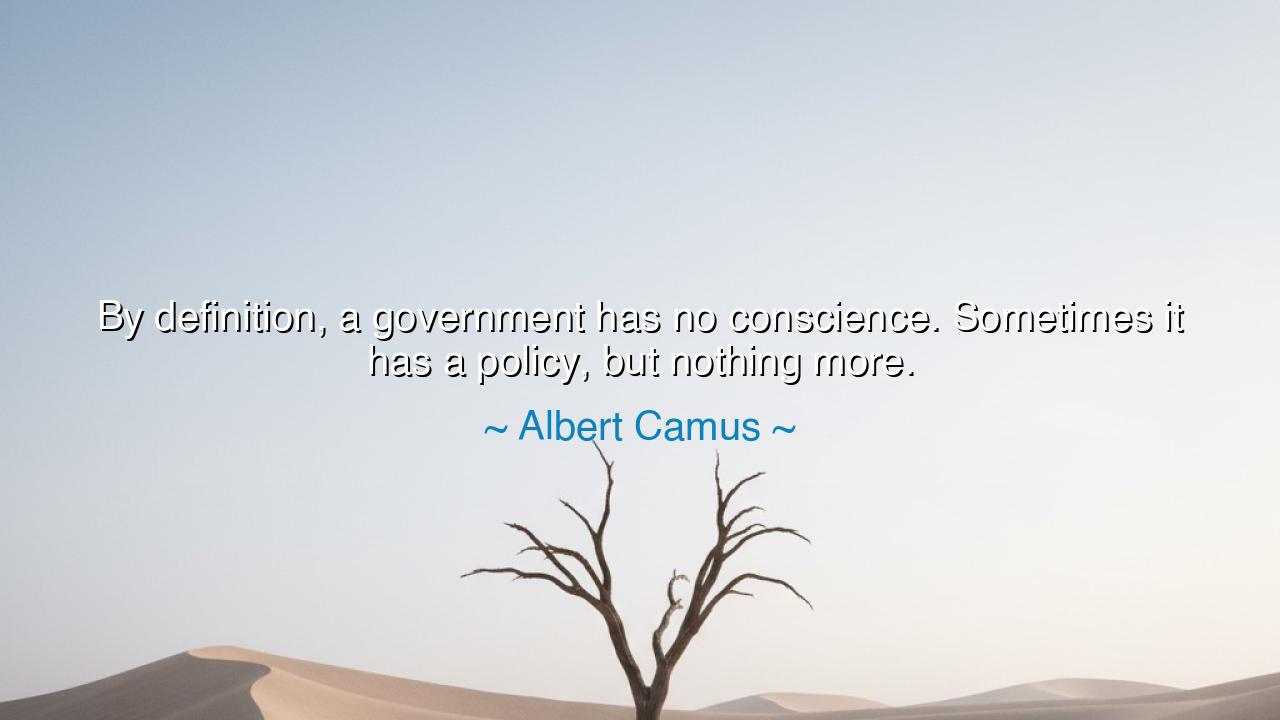
By definition, a government has no conscience. Sometimes it has a
By definition, a government has no conscience. Sometimes it has a policy, but nothing more.






“By definition, a government has no conscience. Sometimes it has a policy, but nothing more.” — Albert Camus
The words of Albert Camus cut through the ages like a cold wind upon the desert of human institutions. When he spoke of government, he did not speak of kings, ministers, or clerks, but of the vast and faceless machine that men build to rule other men. A government, said Camus, is not a living soul. It does not weep for the fallen, nor rejoice with the free. It acts, it calculates, it enforces — but it does not feel. To expect conscience from it is like asking a sword to be merciful, or a clock to dream.
In the wisdom of the ancients, there is a warning: that which is built without heart will one day devour those who gave it power. So it is with the state. A government may claim justice as its banner, but its policy is often the child of convenience, fear, or ambition. The beating hearts of its people — their griefs, loves, and quiet hopes — are lost amidst decrees and ledgers. It may pass laws in the name of virtue, yet enforce them without compassion. It may send soldiers into the field for “peace,” yet fill the fields with ashes. The policy remains, but the conscience is gone.
Consider the tale of the Roman Empire, mighty and enduring, whose legions marched beneath the eagle of destiny. Rome had policy — clear, efficient, unbending. It governed with laws that reached from Britannia to Egypt. Yet, when conscience was demanded — when mercy called for the sparing of Carthage, or when truth cried out against the persecution of innocents — Rome did not hear. For the Empire had no soul; only its citizens did. And when those citizens lost the will to question, the Empire’s stones fell into ruin. It was not conquered by barbarians alone, but by its own moral silence.
In our own time, the story repeats. The twentieth century — Camus’ century — witnessed nations that worshiped policy as divine law. They organized hunger, legislated cruelty, and justified slaughter in the name of progress. Men in offices decided who would live and who would vanish. The cold machinery of state hummed on, obeying its own logic, indifferent to the cries beneath its wheels. This is what Camus saw — not the evil of a single tyrant, but the absence of conscience in the very design of governance.
Yet this truth is not spoken to breed despair, but to awaken vigilance. If governments have no conscience, then it is the duty of men and women to be that conscience. The state may not feel, but its servants can. The law may be blind, but its makers and enforcers must see. When a nation acts unjustly, it is not the faceless idea that sins, but the people who choose silence. Camus reminds us: do not expect morality from institutions; plant it within yourself and let it grow outward.
Therefore, O listener, take this lesson into your heart. Never surrender your voice to the crowd, nor your judgment to the flag. Question every decree that wounds the innocent. Demand that power remember the human cost of its “policy.” When you see injustice defended by the cold reasoning of order, speak as if your words were fire — for conscience lives only when it is spoken.
Let the governments of the world remain what they are — vast engines of policy. But let the people, the living and the breathing, become their soul. Let them move their leaders by the weight of their compassion, not by the fear of their revolt. For only when conscience flows upward from the governed to the governing does justice become more than a word. And if ever you forget this truth, remember the echo of Camus: the state has no heart — but you do. Use it well, and the world may yet remember mercy.






AAdministratorAdministrator
Welcome, honored guests. Please leave a comment, we will respond soon